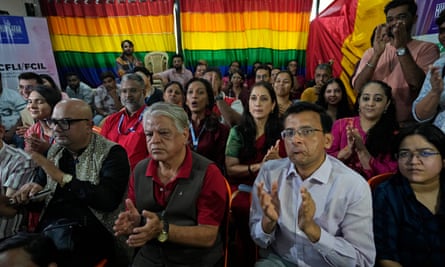The Supreme Court of India has rejected the idea of legally recognizing same-sex marriages, stating that it falls outside of their jurisdiction and should be determined by the government, while also stressing that LGBTQ+ relationships should not be subject to discrimination by the government.
The decision on marriage will be a letdown for members of the LGBTQ+ community in India, who were anticipating that the supreme court justices would acknowledge their constitutional entitlement to equal marriage.
The five-judge panel of India’s supreme court, headed by the chief justice, showed that the topic is still highly debated in the country. They were split on the issue and each of the five judges wrote their own separate opinion. While two judges were in favor of legalizing same-sex civil unions, the majority decision was against it.
One of the attorneys involved in the case, Rohin Bhatt, stated: “The court has once again confirmed that individuals who identify as queer will continue to be controlled by an uncompassionate legislative branch and an uncaring executive branch. Despite what the judicial system claims, we are still treated as inferior citizens. We will respond with anger and demonstrations.”
In 2018, the highest court in India overturned a law from the colonial period that prohibited homosexuality. Although more people are becoming accepting of homosexuality, Indian society remains mostly traditional and there was opposition to allowing same-sex marriage. Same-sex couples continue to experience widespread discrimination and mistreatment in society.
Ankita Khanna, one of the individuals who filed the petition, expressed feeling “extremely let down”.
She stated that the hearings and the subsequent months had instilled a great deal of optimism in us. We felt reassured knowing that our case was being considered by the highest court in the land and that our challenges were being thoroughly discussed.
Today’s ruling was a divided one, lacking clarity on how the law could address the issues faced by our diverse and unequal LGBTQ+ community.
Khanna stated that despite everything, the LGBTQ+ community will keep progressing together with strength and perseverance, as they have always done.
The BJP, a Hindu nationalist party in power, had disagreed with the case, labeling the arguments for equality as “urban elitist opinions” and asserting that marriages cannot be compared to the traditional Indian family structure of a husband, wife, and children. They believed that the decision should be made by parliament rather than the court.
A group of LGBTQ+ individuals and activists joined forces to file a collective lawsuit in India, advocating for the amendment of the special marriage act. This act currently permits civil unions between couples of different religions, but the petitioners are fighting for it to also include same-sex couples. In India, LGBTQ+ couples face discrimination and are denied basic rights such as joint bank accounts, being recognized as legal next of kin, and inheriting property, despite marriage being an important aspect of society.

The fervent debates in support of the lawsuit, which were presented in a series of lengthy hearings in April and May, were closely monitored nationwide as they were broadcast live from the court.
However, on Tuesday, the chief justice of India, DY Chandrachud and the four other judges ruled that amending the special marriage act went beyond the scope of the court, amounting to “judicial lawmaking”, and was instead the job of the legislature.
Chandrachud’s decision highlighted the importance of allowing LGBTQ+ individuals to select their own partners and live together without facing legal discrimination.
“Selecting a life companion is a crucial aspect of determining one’s path in life. For some, it may be seen as the most significant choice they will ever make,” he expressed. He directed the government to establish a top-level group to investigate the issues, rights, and benefits entitled to same-sex couples.
“Chandrachud emphasized that queerness is not limited to urban elites or confined to the upper echelons of society. He also advocated for LGBTQ+ couples to have the right to adopt, although his stance was ultimately overruled by the majority of the bench.”
Karuna Nundy, a lawyer from the supreme court who is handling the case, stated after the court proceedings that the bench’s decisions have continued to advance LGBTQ+ rights. She pointed out that there were previous rulings that highlighted the state’s responsibility to consider civil unions and to acknowledge and honor the relationships of queer couples.
Justice Kaul, a member of the bench, was one of the individuals who showed their backing for civil unions between same-sex couples. He stated, “Unions between non-heterosexual and heterosexual individuals should be seen as two sides of the same coin.”
Source: theguardian.com
















